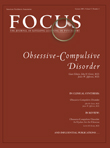Telephone Administered Cognitive Behaviour Therapy for Treatment of Obsessive Compulsive Disorder: Randomised Controlled Non-inferiority Trial
Abstract
OBJECTIVES:
To compare the effectiveness of cognitive behaviour therapy delivered by telephone with the same therapy given face to face in the treatment of obsessive compulsive disorder. Design: Randomised controlled non-inferiority trial. Setting: Two psychology outpatient departments in the United Kingdom. Participants: 72 patients with obsessive compulsive disorder. Intervention: 10 weekly sessions of exposure therapy and response prevention delivered by telephone or face to face. Main outcome measures: Yale Brown obsessive compulsive disorder scale, Beck depression inventory, and client satisfaction questionnaire. Results: Difference in the Yale Brown obsessive compulsive disorder checklist score between the two treatments at six months was −0.55 (95% confidence interval −4.26 to 3.15). Patient satisfaction was high for both forms of treatment. Conclusion: The clinical outcome of cognitive behaviour therapy delivered by telephone was equivalent to treatment delivered face to face and similar levels of satisfaction were reported.
(Reprinted with permission from the BMJ Publishing Group Ltd., 2006; 333(7574):883–887)



